 As I listened to NPR’s piece this morning on the 50th anniversary of the War on Poverty, I was struck by the fact that very little has changed. I decided to read President Lyndon B. Johnson’s famous address to Congress. That internet search led me to the March 1964 Special Message to Congress that accompanied President Johnson’s proposed Economic Opportunity Act of 1964—I strongly encourage anyone who hasn’t read it, to take a moment and do so. The message lays out the fundamentals for the creation of what are now today’s safety net programs, programs that are slowly being dismantled.
As I listened to NPR’s piece this morning on the 50th anniversary of the War on Poverty, I was struck by the fact that very little has changed. I decided to read President Lyndon B. Johnson’s famous address to Congress. That internet search led me to the March 1964 Special Message to Congress that accompanied President Johnson’s proposed Economic Opportunity Act of 1964—I strongly encourage anyone who hasn’t read it, to take a moment and do so. The message lays out the fundamentals for the creation of what are now today’s safety net programs, programs that are slowly being dismantled.
In the Special Message to Congress, President Johnson said, “There are millions of Americans—one fifth of our people—who have not shared in the abundance which has been granted to most of us, and on whom the gates of opportunity have been closed. What does this poverty mean to those who endure it? It means a daily struggle to secure the necessities for even a meager existence. It means that the abundance, the comforts, the opportunities they see all around them are beyond their grasp.”
Fifty years later and there are still millions of people across the country struggling to make ends meet. In the Washington metropolitan region alone, more than 200,000 women and girls are living in poverty. Just last month, the Washington Post profiled the day-to-day struggle of a woman and her family living in DC, a painstaking reminder that the war has not been won. Did anyone even know that a war was being waged?
President Johnson continued, “The war on poverty is not a struggle simply to support people, to make them dependent on the generosity of others. It is a struggle to give people a chance. It is an effort to allow them to develop and use their capacities, as we have been allowed to develop and use ours, so that they can share, as others share in the promise of this nation. We do this, first of all, because it is right that we should.”
Truer words have never been spoken. I was reminded of this last fall when Sharon Williams so poignantly addressed the audience at our annual Leadership Luncheon. She talked about life happening to her and the despair she felt until she found an opportunity: “I began to believe within myself that if given the opportunity—people living in less than ideal conditions and having less than ideal situations could and would do great things.”
All Sharon needed was an opportunity. As we embark upon a new year, let’s not waste the opportunities before us. Let’s not have this same conversation 50 years from now.
As President Johnson said, “Today… we have the power to strike away the barriers to full participation in our society. Having the power, we have the duty. The Congress is charged by the Constitution to ‘provide…for the general welfare of the United States….’ Now Congress is being asked to extend that welfare to all our people.”
Fifty years later, the message is the same: the time to act is now. Ending poverty could become a reality, but it will take all of us working together. May this be our nation’s New Year’s resolution for 2014.
Jennifer Lockwood-Shabat is vice president of Washington Area Women’s Foundation.

